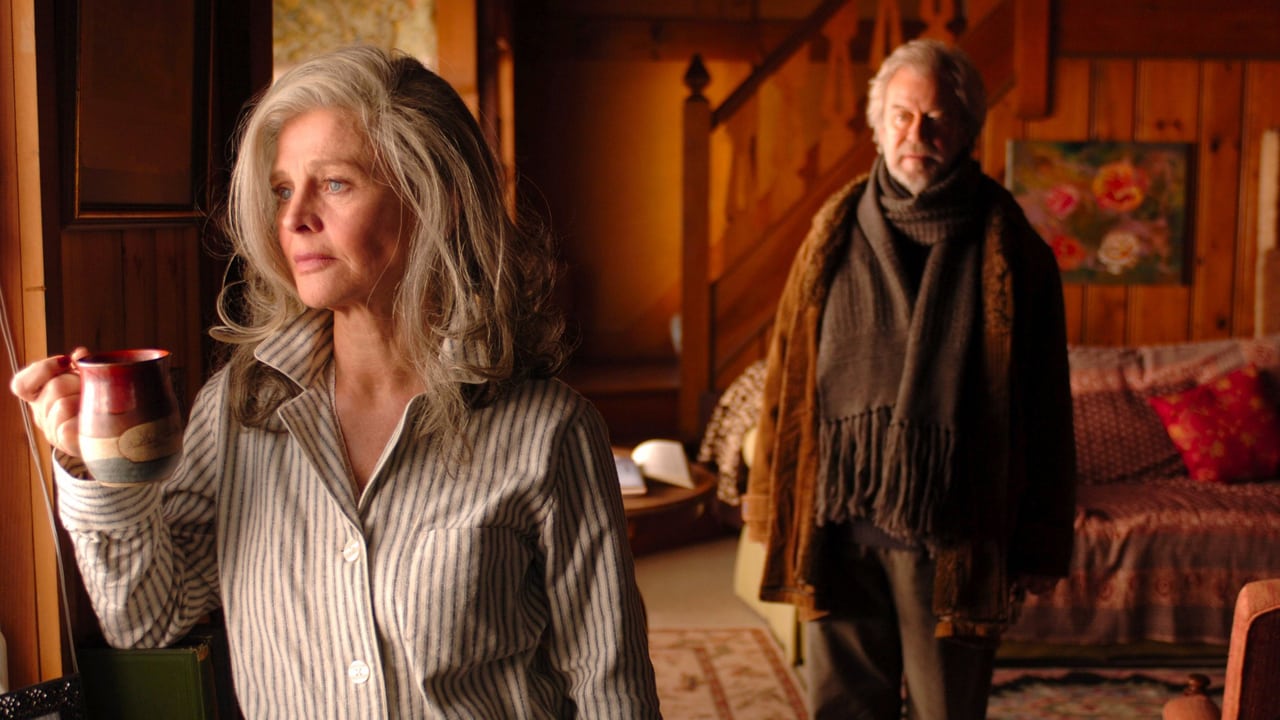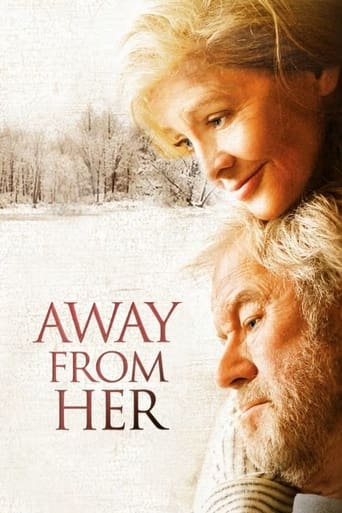

Whilst I think some people who have experience of dealing with people with Alzheimer's are clearly letting that cloud their judgment of the film, it is a film after all so you have to allow for artistic licence. None of which diminished what was a very moving account of a couple going into this stage of their relationship. I just found the whole situation very believable and some of the imagery stunning. For me it was a very subtly acted film that dealt extraordinarily well with its subject. I don't feel I need to have experience of Alzheimer's to know that this film speaks from the heart. I thought Polley cast the film well and told a very adult story at a very young age well and with maturity beyond her years.
... View MoreThe debut feature from talented Canadian director Sarah Polley, AWAY FROM HER is a love-story set in a care home involving Fiona Anderson (Julie Christie) and Aubrey (Michael Murphy). The plot unfolds slowly, but then Polley is very much preoccupied with the mise-en-scene. The action takes place during midwinter in the frozen wastes of Canada: the snow on the ground and the crisp winter air offer a fitting metaphor for the state of the Andersons' marriage as Fiona's husband Grant (Gordon Pinsent) comes to the realization that his wife will no longer be living full-time at home, and that their relationship is effectively over. He has little to look forward to except a cold, bleak existence alone, with only occasional visits to see his wife in the care-home.Polley is exceptionally good at capturing Fiona's gradual discovery that she has Alzheimer's. From the sequence where she puts a frying-pan into the refrigerator, to the sequence on a winter's night where she stands alone on a bridge shivering to death, we understand how her grasp of the world around her is gradually receding. Grant desperately tries to convince himself (and her) that this is a temporary condition, but Fiona herself knows precisely what is happening to her. Christie gives us a portrayal of a strong-minded woman aware of life's realities, however unpleasant they might be.The atmosphere at the care home is stunningly re-created, from the pristine walls of the corridors to the impersonal dining-room, where the residents sit quietly chatting to one another under the eyes of the staff. Madeleine Montpellier (Wendy Crewson) is the very epitome of efficiency in her black two-piece suit, giving prospective residents a guided tour of the facility while pointing out the fact that the corridors attract plenty of "natural light." The implication is clear: much of life in the facility is "unnatural" for the residents, the majority of whom simply pass away the time in miscellaneous activities, aided by artificially bright staff trying their best to make everything seem wonderful. The residents' impassive faces sum up their lives; Polley's camera captures the emptiness of their lives through slow pans of their common-rooms.In this kind of environment, any prospect of a love-affair between two residents must be applauded. However much Grant might resent his spouse's action, he cannot blame her for it. The surprise ending catches all of us by surprise, yet seems somehow right in terms of the film's earlier logic.AWAY FROM HER is a sympathetic yet uncompromising portrait of people trying to cope with Alzheimer's, that should serve as an example to us all.
... View MoreThis film could have deserved the high ratings it has received, but I think those ratings are based on the emotional factor of this film which, I agree, is high, hence my giving it 5 stars. However, there are several things lacking in this movie which took away the other 5 stars. Some things are just too unrealistic:There seems to be no friends or family of the main characters * The head nurse seems to have all the time in the world and never seems to be doing anything * The husband doesn't call police or even seem upset when his wife takes off on skis and goes missing. * There are no family pictures or music or any effort at all to remind the wife of who she is. The husband is totally unhelpful in this regard. Once he grabs her by the shoulders and tells her who he is, but otherwise is just too calm and too removed.If they would have added some elements of realism to this scenario, it would have been a lovely movie.
... View MoreWatching this movie, I was struck by its maturity and the way in which the two senior characters defy the stereotype of age, depicted as socially and sexually active people grappling with the loss of their independence through the insidious affliction of dementia (in this case, the diagnosis is probable Alzheimer's). Christie is just about ageless; that Doctor Zhivago was more than forty years ago when this film was made is testament to her longevity as an actress of distinction, and to her eternal beauty. Her character's (Fiona) cognisance of her deterioration as she fluctuates between lucidity and incoherence is frightening to contemplate.Fiona's forgetfulness is beginning to accelerate when we're introduced, her apparently long suffering husband Grant (Pinsent) familiar with the practice of looking in draws for misplaced items, turning off appliances and closing doors that have been opened for no apparent reason. He's trying to comprehend not only how he'll exist without his soul mate, but how he can offer her the dignity she deserves. As Fiona regresses in mind, he places her in care where she forms a co-dependency with in-patient Aubrey (Murphy). In turn, Grant and Aubrey's wife (Dukakis) forge a mutually beneficial relationship where the two can reveal their struggles and despair. Pinsent is stoic, courageous and he gives his character a mature integrity that is powerful to experience.I draw parallels between this film and the Jean Simmons - Joss Ackland drama "Daisies in December", as they both treat their senior subjects with dignity and forthrightness. There's no self indulgent sob stories, where the sympathy card is played at every given opportunity with the sole purpose of giving the audience damp eyes, and although it's at times confronting and uncomfortable, it is an apparently honest depiction of the nightmarish consequences of dementia. Tough to bear at times, but highly recommended.
... View More